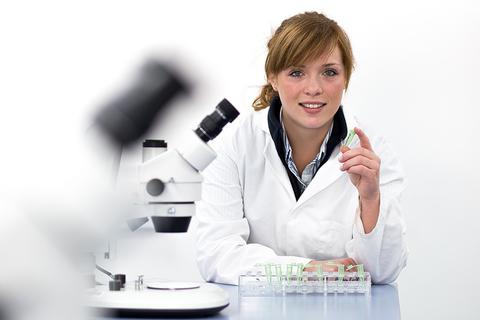Rebecca McLean on placement


On placement… Immunology research
Becca on mentoring younger students
Becca, who came top out of all UK undergraduates in the prestigious Alltech Young Scientist Awards 2013, spent some of her spare time at university mentoring a year 11 science group in a local secondary school, helping pupils with biology and chemistry studies. “Becoming a student ambassador allowed me to embrace an excellent opportunity to mentor GCSE science students at a local school. During the classes I was able to help many of the students, not only with their GCSE work, but also by answering questions they had about studying at university. I especially enjoyed helping students that didn’t grasp specific topics as quickly as others, but didn’t want to tell the teacher in front of their classmates. I found explaining topics in varying ways specific to the students learning technique very rewarding.”
Most of our animal-related courses include a strong core of highly applied science, which most students enjoy as it helps you to understand and manage real life situations working with animals. Many students, even those who disliked science at school, discover a fascination that can lead to great careers.
“I never really knew what I wanted to do as a career after my degree, so I had always hoped that my placement year would enlighten me to my future – it most definitely did!”
Rebecca McLean spent her placement year with the Animal Health Trust as a Research Assistant and is going on to study for a doctorate.
During her placement year Rebecca (known as Becca) worked within the immunology department at the veterinary charity, which cares for the health and welfare of animals. She found that she loved the laboratory environment – so much so that she is about to begin a career in immunology research. “Each day on placement I would plan what laboratory work I had to undertake then at the end of each day I would write up all my results. I really enjoyed the lab work and getting good results! My supervisors, Dr Romain Paillot and Mrs Nicola Rash were fantastic, teaching me many new techniques that I was able to develop and expand throughout the year.
“Most days I would be collecting samples required for my laboratory work, which meant communicating with many different departments, followed by an afternoon of working on my research project in the laboratory, then writing up my findings in my office.
“Without my placement year I wouldn’t be able to go on to study a PhD as I wouldn’t have the laboratory experience that would be required. I also would not have known about the possibility of a PhD if I hadn’t worked with people that were undertaking them whilst I was there.”
The 22-year-old was also able to write her honours research project – usually completed during students’ final year – whilst on placement, which freed her up to concentrate on her assignments and exams when she returned to Harper Adams. She even wrote her own published scientific journal!
“Placement gave me confidence and knowledge of the research industry, which makes me stand up head and shoulders above other biovet graduates without any experience.”
Having now graduated Becca will be moving to Edinburgh to be in life as a PhD student, working on a three-year studentship for the Moredun Research Institute. She will be researching the activation of immune responses using ovine lentivirus vaccine vectors, and there will be plenty of time to spend in the laboratory, and for writing each chapter of her thesis as she progresses.
Becca on Harper Adams
What attracted you to Harper Adams?
The placement year.
Why did you choose your course?
I have a keen interest in animals and science.
Tell us a little about what it involved.
Small class sizes undertaking dissections, parasite analysis and diagnostic testing. Trips to A.I. stud yards and also abattoirs.
Are you glad you chose it?
I have had the best practical experiences! And the people here are fab.
What is the teaching like?
Fantastic. Lecturers are available often and are more than willing to help as they want to get the best out of you.
And the facilities?
Top notch. The labs are a beautiful environment to work in. The library is lovely and has everything you need in it!
What have been your highlights?
Meeting some of the best friends I have ever had. The social life here is great.
What else did you get involved in at university?
Netball, being a student ambassador, mentoring, bar work.
Becca’s PhD research
Activation of immune responses using ovine lentivirus vaccine vectors
Infectious diseases of livestock are an important problem for farmers and cause significant economic losses and animal suffering. For many diseases, protective vaccines either do not exist or are not effective at preventing disease and it is recognised that new strategies are required to deliver vaccine antigens that can safely elicit protective immune responses. One new approach has focussed on the use of lentiviruses as a vaccine delivery system. These viruses have attracted attention as candidate vaccine vectors because of their ability to initiate strong and long-lasting specific immune responses.
Although there are many advantages to the use of lentiviruses as delivery systems, many safety considerations must be understood and precautionary measures undertaken to attain the best possible vector, carefully balancing safety with effectiveness.
During Becca’s PhD project, she will analyse what safety measures can be incorporated into the delivery system without reducing the efficiency of the immune response generated.




